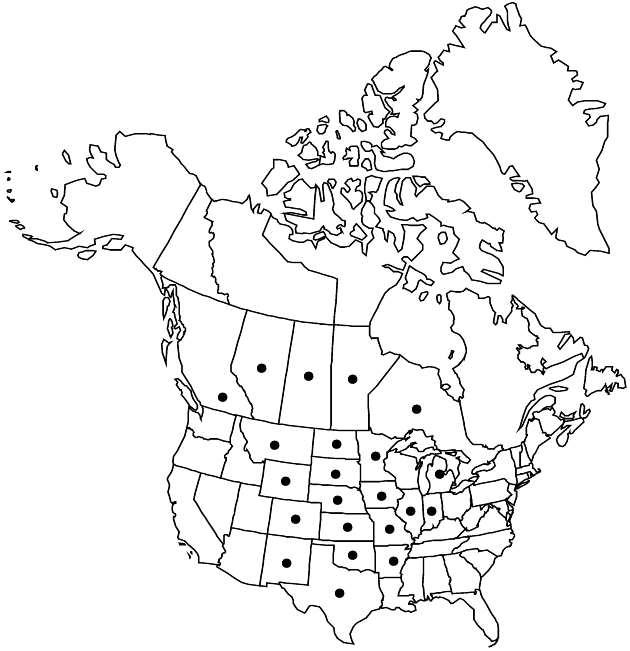familyAsteraceae
genusSolidago
sectionSolidago sect. Solidago
subsectionSolidago subsect. Nemorales
speciesSolidago nemoralis
subspeciesSolidago nemoralis subsp. decemflora
Difference between revisions of "Solidago nemoralis subsp. decemflora"
Phytologia 58: 430. 1985.
Endemic
Basionym: Solidago decemflora de Candolle in A. P. de Candolle and A. L. P. P. de Candolle, Prodr. 5: 332. 1836
Synonyms: Doria pulcherrima (A. Nelson) Lunell S. canadensis var. canescens A. Gray S. longipetiolata Mackenzie & Bush S. nemoralis subsp. longipetiolata (Mackenzie & Bush) G. W. Douglas S. nemoralis var. decemflora (de Candolle) Fernald S. nemoralis var. longipetiolata (Mackenzie & Bush) E. J. Palmer & Steyermark S. pulcherrima
FNA>Volume Importer |
imported>Volume Importer |
||
| (One intermediate revision by the same user not shown) | |||
| Line 6: | Line 6: | ||
|place=58: 430. 1985 | |place=58: 430. 1985 | ||
|year=1985 | |year=1985 | ||
| + | }} | ||
| + | |special_status={{Treatment/ID/Special_status | ||
| + | |code=E | ||
| + | |label=Endemic | ||
}} | }} | ||
|basionyms={{Treatment/ID/Basionym | |basionyms={{Treatment/ID/Basionym | ||
| Line 79: | Line 83: | ||
|publication title=Phytologia | |publication title=Phytologia | ||
|publication year=1985 | |publication year=1985 | ||
| − | |special status= | + | |special status=Endemic |
| − | |source xml=https:// | + | |source xml=https://bitbucket.org/aafc-mbb/fna-data-curation/src/2e0870ddd59836b60bcf96646a41e87ea5a5943a/coarse_grained_fna_xml/V19-20-21/V20_347.xml |
|tribe=Asteraceae tribe Astereae | |tribe=Asteraceae tribe Astereae | ||
|genus=Solidago | |genus=Solidago | ||
Latest revision as of 20:02, 5 November 2020
Basal leaves often linear-oblanceolate, usually not crenate. Involucres usually 4.6–5.8 mm. Disc corolla lobes (0.6–) 0.8–1.5 mm. Cypselae moderately strigose; pappi usually exceeding ray corolla tubes and bases of disc corolla lobes. 2n = 36.
Phenology: Flowering Aug–Oct.
Habitat: Open, sandy and gravelly soils, disturbed sites, roadsides, prairies and grasslands, drier open mixed deciduous and conifers woods
Elevation: 200–1600 m
Distribution

Alta., B.C., Man., Ont., Sask., Ark., Colo., Ill., Ind., Iowa, Kans., Mich., Minn., Mo., Mont., Nebr., N.Mex., N.Dak., Okla., S.Dak., Tex., Wyo.
Discussion
Subspecies decemflora is the tetraploid prairie and lower elevation cordilleran race of the species. Combinations based on Solidago longipetiolata have been applied to this race; the name does not have nomenclatural priority.
Selected References
None.
Lower Taxa
None.